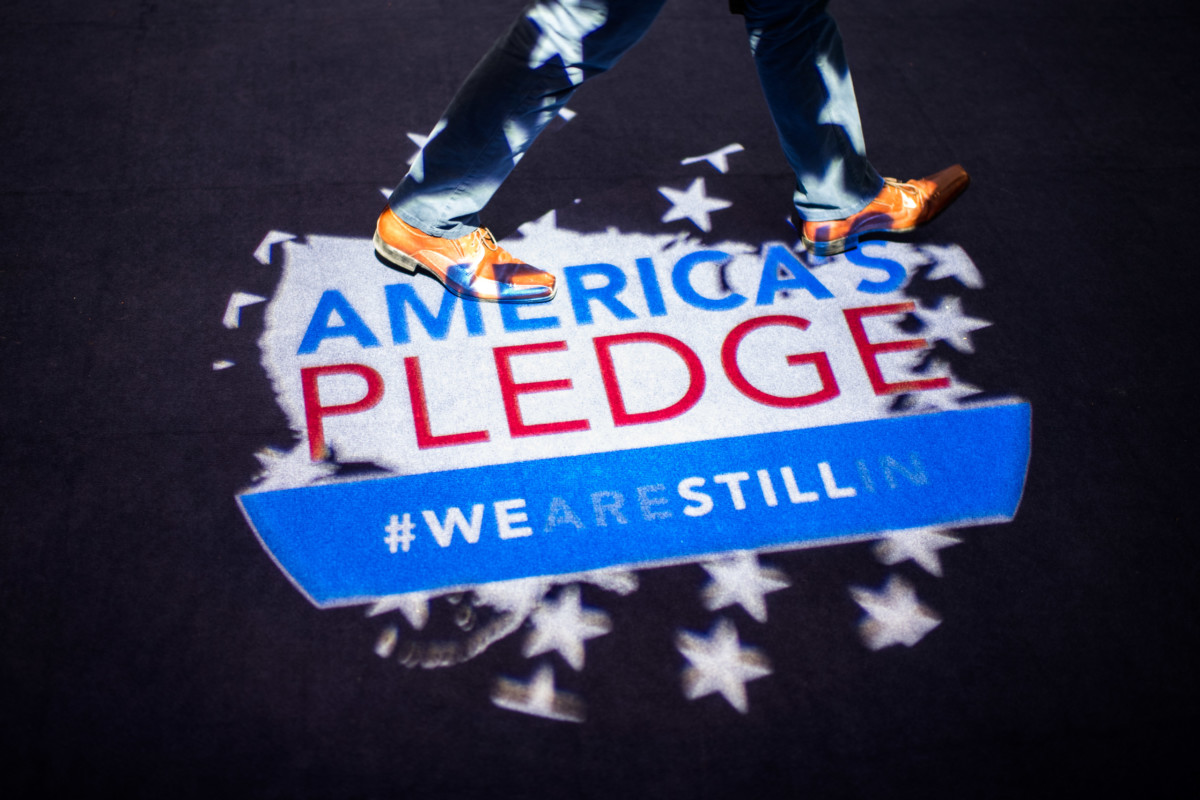One year ago, in an inaccuracy-laden speech in the Rose Garden, President Trump announced his intention to pull the US out of the Paris climate agreement. The announcement shook international climate politics to its core, leading many to question whether international momentum on climate change would grind to a halt.
In response, a groundswell of non-federal leaders has emerged, vowing to support the goals of the Paris agreement despite the actions of the federal administration. Governors Jerry Brown of California, Jay Inslee of Washington State and Andrew Cuomo of New York launched the US Climate Alliance, which now has 17 member states. Meanwhile, US businesses, universities and local governments launched the “We Are Still In” coalition, which now has more than 2,700 members.
The growing sub-national climate movement has been welcomed as providing much-needed counterbalance to the inactions of the Trump administration. Still, during the latest round of UN climate talks in Bonn, Germany, tension rose over one significant oversight. While US business, city and state pledges to reduce greenhouse gas emissions were laudable, the sub-national movement was not working to address the gap in funding to developing countries that the Trump administration opened.
When Trump pulled out of the Paris climate agreement, the administration also abandoned the US’s pledge to the Green Climate Fund (GCF) — a key channel for international climate finance, which helps developing countries adapt to climate change and pursue low-carbon and climate resilient development. The US had pledged $3 billion in 2014 and, under Obama, had delivered only one-third of that pledge. As such, Trump’s actions have left a $2 billion gap that will limit the important work of the GCF and leave those most vulnerable to climate change without support.
To fill that gap, the We Are Still In Coalition and US Climate Alliance have pledged approximately $0. The closest thing to action came from Massachusetts, which is attempting to establish a fund to help least developed countries, and Seattle, which passed a resolution I helped write, recognizing not just the responsibility to reduce carbon emissions, but also to address the gap in climate finance. But now, Seattle leaders say they’re not willing to act unless others act with them. So far, the response from the rest of the “We Are Still In” movement has been silence.
Some non-federal government officials claim that they don’t have the money, but if leaders within the richest country and biggest polluter on Earth are not willing to pay, then how can we fairly ask the poorest countries to pay to reduce their emissions?
The least developed countries, which are least responsible for causing climate change yet most vulnerable to its impacts, must be watching in disbelief. While the US ignores its climate debt to the developing world, 11 relatively wealthy US cities and counties that are among the largest emitting jurisdictions in the world have launched legal cases claiming climate reparations from fossil fuel companies.
While I hope they win their justified lawsuits, if they do so without also addressing their own climate debt, climate justice will be turned somewhat on its head.
The Paris climate agreement recognizes that developed countries, which have emitted more than their fair share of carbon emissions, have a moral responsibility to not only reduce their emissions, but also to help those who are impacted by their emissions both to adapt to climate change and to pursue resilient low-carbon development. With the Trump administration’s immoral behavior, that responsibility now falls to those who claim they are “still in.”
In a few months, leaders from the burgeoning US sub-national climate movement are meeting in San Francisco at the Global Climate Action Summit, a summit meant to celebrate and spur on sub-national climate action. If they meet without addressing international climate finance, they will abdicate their moral responsibility to help those who are harmed by the US’s carbon pollution. If they are really “still in” the Paris climate agreement, then it’s time they showed us the money.
Note: A version of this article appears in the journal Ethics, Policy & Environment.
Join us in defending the truth before it’s too late
The future of independent journalism is uncertain, and the consequences of losing it are too grave to ignore. To ensure Truthout remains safe, strong, and free, we need to raise $33,000 in the next 2 days. Every dollar raised goes directly toward the costs of producing news you can trust.
Please give what you can — because by supporting us with a tax-deductible donation, you’re not just preserving a source of news, you’re helping to safeguard what’s left of our democracy.
